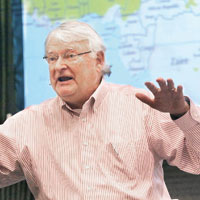 Comments on Libya puzzle ex-CIA chief
Comments on Libya puzzle ex-CIA chief
STORY
The former deputy director of central intelligence says he’s puzzled that five days after the Sept. 11 attack on the U.S. consulate in Benghazi, Libya, a top diplomat appeared on Sunday morning network news shows repeatedly describing the incident as a spontaneous protest over an anti-Islamic video.
“I can’t understand why we didn’t have a more comprehensive assessment of what happened in Benghazi,” says Dick Kerr over U.N. Ambassador Susan Rice’s insistence the attack that killed U.S. ambassador to Libya Christopher Stevens and three other Americans was spontaneous and not a well-planned terrorist assault on the consulate.
“It is inconceivable to me that we could not say it was an attack by terrorists,” said Kerr, a barrier island resident who spent a much of his career providing or managing daily intelligence briefings for presidents from Jimmy Carter to George H.W. Bush.
“Our current assessment is that what happened in Benghazi was in fact initially a spontaneous reaction to what had just transpired hours before in Cairo, almost a copycat of the demonstrations against our facility in Cairo, which were prompted, of course, by the video,” Rice said on NBC’s “Meet the Press” on Sept. 16. She also took the same line on CBS “Face the Nation” and Fox News that Sunday.
Kerr said Rice didn’t have the clout to get on all those shows. “The fact that she did that had to have come from the White House,” he said.
Rice’s comments and the issue of what the Obama administration knew about the attack and when it knew things sparked fierce disagreement between the president and GOP challenger Mitt Romney in their debates.
“I don’t know why it is a political problem,” Kerr said. “The way they did it made it a political problem. The way they’ve done it just compounds the problem. Political advisors are getting in the way of policy advisors.
“It seems like an attempt to avoid recognizing al-Qaeda is not dead,” he said.
Three days after Rice’s television appearances, National Counterterrorism Center Director Matthew Olsen told the Senate Homeland Security Committee incident was a “terrorist attack.”
Kerr said that because he understands the way the president’s daily intelligence briefing is handled, he remains perplexed by Rice’s comments.
“Right now, intelligence officials pretty much have their hands tied,” he said, adding it eventually will “come out” what information Rice used in making her remarks.
“We’re going to find out who gave the intelligence to Rice,” said Kerr, noting all intelligence assessments have time stamps and dates and they will provide a road map of who knew what and when.
Over the years, Kerr said, the intelligence process for dealing with a crisis like Benghazi has changed little. “The people changed but the process followed the same course,” he said.
“I spent a whole career working on crises,” Kerr said, adding he started his CIA career with the Cuban Missile Crisis.
With Sept. 11 having a significant meaning to terrorists, Kerr said intelligence services “almost certainly” would have monitored crowds around American installations in the Arab world.
From the time the Benghazi consulate was attacked, intelligence is sifted and analyzed in 24-hour-a-day situation rooms.
In fact, Kerr said a drone flew over the Benghazi consulate during the seven-hour attack, taking photographs, transmitting videos and providing real-time intelligence on the attack.
The drone’s eagle-eye look at events on the ground could grow. Just last week, CIA Director David H. Petraeus proposed increasing his agency’s drone fleet to answer terrorism threats in North Africa, the Middle East and Afghanistan.
According to Kerr, the CIA, Defense Intelligence Agency, the National Security Agency and the State Department would have continued to develop situation reports on Benghazi overnight and then follow that up several times daily as the crisis continued.
“These are things people take very seriously,” said Kerr.
“From my experience, if they didn’t call me, I’d have someone’s butt,” said Kerr, adding that former CIA director John McCone fired a CIA administrator during the Cuban Missile Crisis in 1962 because he wasn’t immediately called about a fairly routine development.
The idea that so many questions about the Benghazi attack were unanswered when Rice went on Sunday morning news show is “unbelievable,” said Kerr, who added both he and his wife thought terrorist attack when they first learned about the Benghazi consulate.
Typically, Kerr said, the president would be briefed the next morning.
In briefing the president, Kerr said the CIA would outline what the agency knew about the situation, what it was worried about and its assessment of the situation. Then, he said, the Department of Defense would offer its assessment and so on.
“Discussion would include what you are going to do about it and all that would be passed onto the president,” Kerr said. “No one would vary from that script or they’d be in deep trouble.
“I’d be surprised if they had not set up a task force,” Kerr said. “They would have done some assessments. The CIA almost certainly did. The deputy director of intelligence was almost certainly involved.
“In intelligence you cannot just say this happened,” said Kerr. “You have to say this happened and this is our assessment of it and what it means.
“The fog of war, in some ways, would be lifted pretty quickly,” he added.
“The intelligence community is certainly well suited to deal with a Middle East crisis,” Kerr said.
“The Middle East has always been a center of attention,” he added, citing the 1967 and 1973 Arab-Israeli wars and decades of terrorist bombings and hijackings. “Hundreds of analysts monitor the Middle East.”








